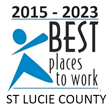Treasure Coast Food Bank, the largest hunger relief organization on Florida’s Treasure Coast, works tirelessly to provide direct services and outreach programs to help support children, seniors, and families in need. With a staff of over 50 employees, and a fleet of more than 10,000 volunteers, TCFB distributes millions of meals annually to our neighbors in Indian River, St. Lucie, Martin, and Okeechobee counties.
Founded in 1988, Treasure Coast Food Bank works to end hunger by providing direct food service programs, running innovative grassroots initiatives, educating the public about the struggles people face in our communities, and advocating on behalf of those in need. In partnership with farmers, manufacturers, retail stores, and nearly 300 schools and partner agencies, Treasure Coast Food Bank serves as a bridge between food sources and individuals who are struggling to put food on the table.
In alignment with a comprehensive strategy established by Feeding America, Treasure Coast Food Bank provides more than 20 programs and initiatives designed to FEED, ENGAGE, NOURISH and EMPOWER the individuals we serve.





